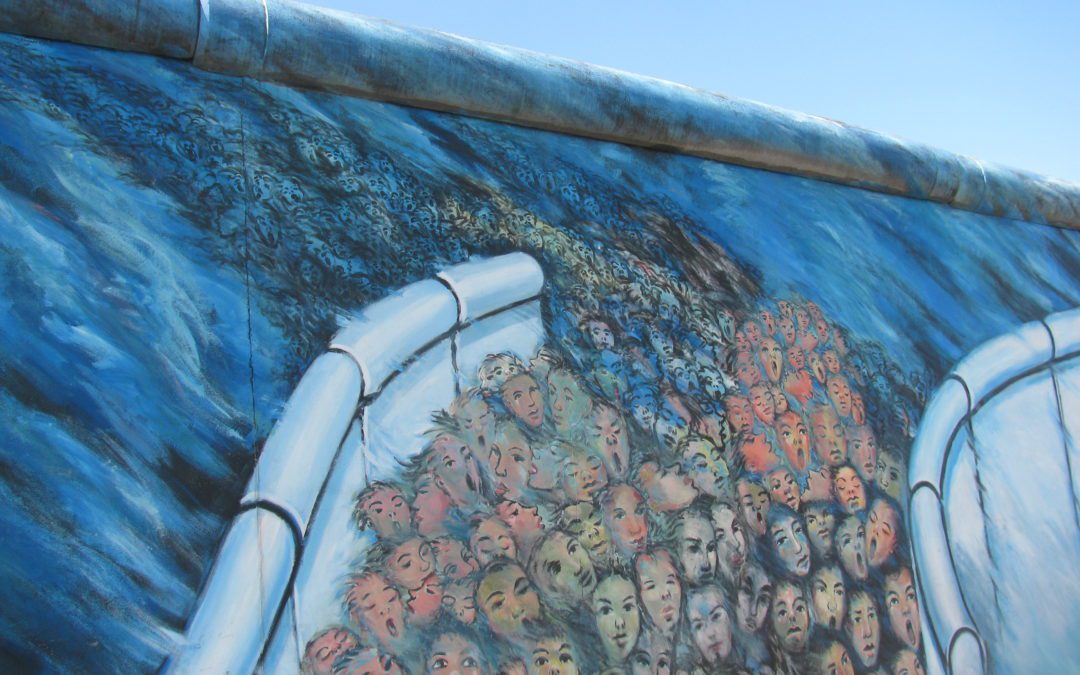A Bureaucrat’s Mistake Led to the Fall of the Berlin Wall
In a country loaded with bureaucrats, it seems oddly fitting that a bureaucratic blunder would lead to the fall of the Berlin Wall.

One of the longest remaining stretches of the Berlin Wall is the East Side Gallery. This is one of dozens of paintings on the Wall today.
To set the scene, the year was 1989, and the Soviet empire was unraveling. In June, Poland held its first free elections since the communists had taken control, and Hungary was opening its borders to Austria. In East Germany, the government was deeply in debt and teetering on collapse, and protests were sprouting up in churches all across the country.
So the East Germans decided to do the unthinkable; they decided to give their people more freedom to travel.
“Working through the night and all that morning, officials of the Interior Ministry and the Ministry of State Security produced what they considered a revolutionary document,” writes Michael Meyer in The Year That Changed the World. “It declared that all East Germans who possessed a passport would be entitled to an exit visa allowing them to pass through any border crossing, anywhere and at any time, including Berlin.”
Enter Gunter Schabowski, who some people now call “the most famous communist nobody knows.” Schabowski was given the job of announcing the new plan before a room packed with international journalists at the government’s daily press briefings. He did as instructed, and that’s when one of the journalists asked the fateful question. The reporter asked when the new travel freedoms would take effect.
If you look at photos of the press conference, you can see the confusion on Schabowski’s face, for he didn’t know the answer. He shuffled through his papers, but he had no idea when the travel restrictions were supposed to be lifted. So what did he do? He answered with the fateful word “Sofort.”Â
Sofort. Immediately. Right now.
That single word was not just an inaccurate answer. It triggered a stampede for the borders. During the next few hours, tens of thousands of East Berliners flocked to the various checkpoints in the city, and the border guards were completely unprepared. They had no idea what to do.
Schabowski’s press briefing was held at 6 p.m., and by 9:30 the mobs at the checkpoints “were becoming more brazen,” Meyer says. “Emboldened by their numbers, they pushed within a few meters of the barricades. Guards stood nervously with their weapons. If things got out of hand, I wondered, would they shoot?”
They didn’t shoot. The guards eventually saw the futility of keeping back the people, so they opened the borders. They didn’t even bother checking passports. The Bornholmerstrasse checkpoint was the first to open, and the famous Checkpoint Charlie border crossing opened up shortly after at 11:17 p.m. People poured from East Berlin into West Berlin, and the world changed forever. People began to tear the Wall down by hand, and then the cranes were sent in a few days later.
What happened to Schabowski? In 1990, the communists expelled him from the party for his role in bringing down the Wall. Then in 1997, Schabowski was convicted and imprisoned by reunified Germany, along with other East German leaders, for giving shoot-to-kill orders to border guards trying to prevent people from escaping the German Democratic Republic (East Germany).
But Schabowski admitted his wrongs and was pardoned and released in 2000, and he went on to become one of the few prominent communist leaders in East Germany to renounce what their government did.
“The whole thing could have finished in a bloodbath,” Schabowski later told a German publication, recalling that fateful date on November 9, 1989. “We were very lucky.”Â
By Doug Peterson
